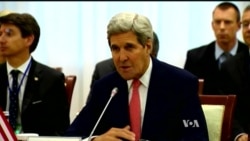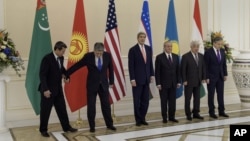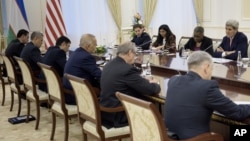U.S. Secretary of State John Kerry on Sunday met Uzbekistan’s autocratic ruler and officials from other Central Asian states accused of being among the world’s worst human rights offenders.
Kerry's visit to Central Asia comes after stops in Europe and the Middle East. On Sunday, he met with the leaders of five former Soviet republics of Kazakhstan, Kyrgyzstan, Tajikistan, Turkmenistan and Uzbekistan, which all are concerned about a resurgence of the Taliban in Afghanistan and the recruitment of their people into terrorist organizations such as Islamic State. Kerry addressed these concerns at the meeting in the ancient Silk Road city of Samarkand.
"We are going to talk about the economic growth and connectivity, the environment, the regional security and stability and the human dimension. In this particular moment of history, economic and security issues go hand in hand. They reinforce each other," Kerry said.
Earlier, Kerry spoke with Uzbekistan's President Islam Karimov, in a rare high-level U.S. encounter with the autocratic ruler and frequent target of human rights criticism.
"Kerry and Karimov discussed global issues of shared concern, including combating violent extremism as well as regional security and stability," said State Department deputy spokesperson Mark Toner.
The 77-year-old Uzbek president has led the country since 1990.
Between pragmatism and human rights
U.S. officials regard Kerry's visit as a way of assuring the Central Asian nations of the strength of their ties to Washington at a time when U.S.-Russian relations are on the decline. But he also is under pressure to speak out against the shortcomings of their human rights records.
U.S.-based Human Rights Watch asked Kerry to press for the release of people wrongfully imprisoned, end impunity for torture, and uphold other key rights commitments.
After the meeting, the C5+1 foreign ministers issued a joint statement declaring their commitment to these and other issues, including boosting regional trade, enhancing a favorable business climate, addressing environmental sustainability challenges and enhancing cooperation to counter threats such as terrorism and trafficking in weapons, illicit drugs and human beings.
"The countries of Central Asia pledged to meet international standards after they became independent, and each is working with us and themselves in order to meet those standards. [Here], as elsewhere, people have a deep hunger for governments that are accountable and effective," Kerry said.
The Committee to Protect Journalists recently urged Kerry to bring attention to journalists jailed for political reasons and online censorship, and to decry physical attacks on members of the media. CPJ says its research indicates media freedom has "steadily worsened" in Central Asia in the post-Soviet era.








